He was hung by his hands to the wall, slapped in the face, punched in the abdomen, kicked in the legs, spat on and cursed. “Are you with them?,” an Israeli Shabak officer asked him. “Are you with them?”
“No,” the Palestinian detainee said, exhausted and looking at the whip resting on the wall, knowing that it was only a matter of time before it would be used on him.
This was a daily routine for Ahmad Abu Ali during his months in Israeli detention in 1979. He was 18 years old.
Abu Ali had been falsely accused by Israel of belonging to an armed Palestinian group.
After six months, he was released, and found his way back to his family in Nablus, a Palestinian city in the occupied West Bank.
“I was just their sandbag Palestinian,” Abu Ali said. “One of hundreds.” He is now 62 and lives in Ottawa, working as a driver.
Abu Ali migrated to Canada in 1981 seeking asylum. He moved to Ottawa in 1984 after spending more than two years in Toronto. He still has faith that one day he will be able to return home to live the rest of his life in a “free Palestine.”
“That day will come,” he said.
When news unfolded about the Hamas-led surprise attack on Israel on October 7, Abu Ali was immediately concerned that his life in Canada was going to become much more complicated.
“It was not the first time the government and the media agitated discrimination between Canadians,” he said, adding that dominant narratives tend to frame Palestinians as instigators of conflict in an imaginary world of peace and harmony.
“As if our day-to-day death and struggles under occupation is considered ‘peaceful.’”
Abu Ali said this kind of notion has produced the idea that Palestinians are somehow inherently violent. “I feel isolated as a Palestinian in this country,” he said.
For many Palestinians in Canada like Abu Ali, the Canadian government and dominant media outlets have not only regurgitated Israeli narratives about its war on Gaza, but have also dehumanized Palestinians by distorting their stories, history and identity.
Palestinians are typically presented either as helpless victims or as dangerous terrorists. Often, they are just numbers.
Israel’s latest war on Gaza began shortly after the Hamas-led surprise attack, during which approximately 240 hostages were taken from Israel into Gaza. The surprise attack resulted in the deaths of approximately 700 civilians in Israel, along with hundreds of military and security personnel, according to the latest figures disclosed by Israel’s far-right government.
The surprise attack came in the context of Israel’s 16-year blockade of Gaza, during which conditions in the besieged strip were described as “unliveable” by the United Nations before Israel’s most recent attack.
Israeli Prime Minister Benjamin Netanyahu declared that the goal of Israel’s revenge campaign was to defeat Hamas. To date, however, Israel’s campaign has killed more than 27,000 Palestinians, decimated Gaza’s civilian and cultural infrastructure, and inflicted a growing humanitarian catastrophe on the entire population.
Responding to a case presented by South Africa accusing Israel of violating the 1948 Genocide Convention, the International Court of Justice (ICJ) recently ordered that Israel take steps to prevent acts of genocide in Gaza.
In the aftermath of October 7, the Canadian government condemned Hamas and offered full-throated support for Israel. Politicians at other levels of government similarly affirmed their support for Israel and condemned protests organized in solidarity with Palestine.
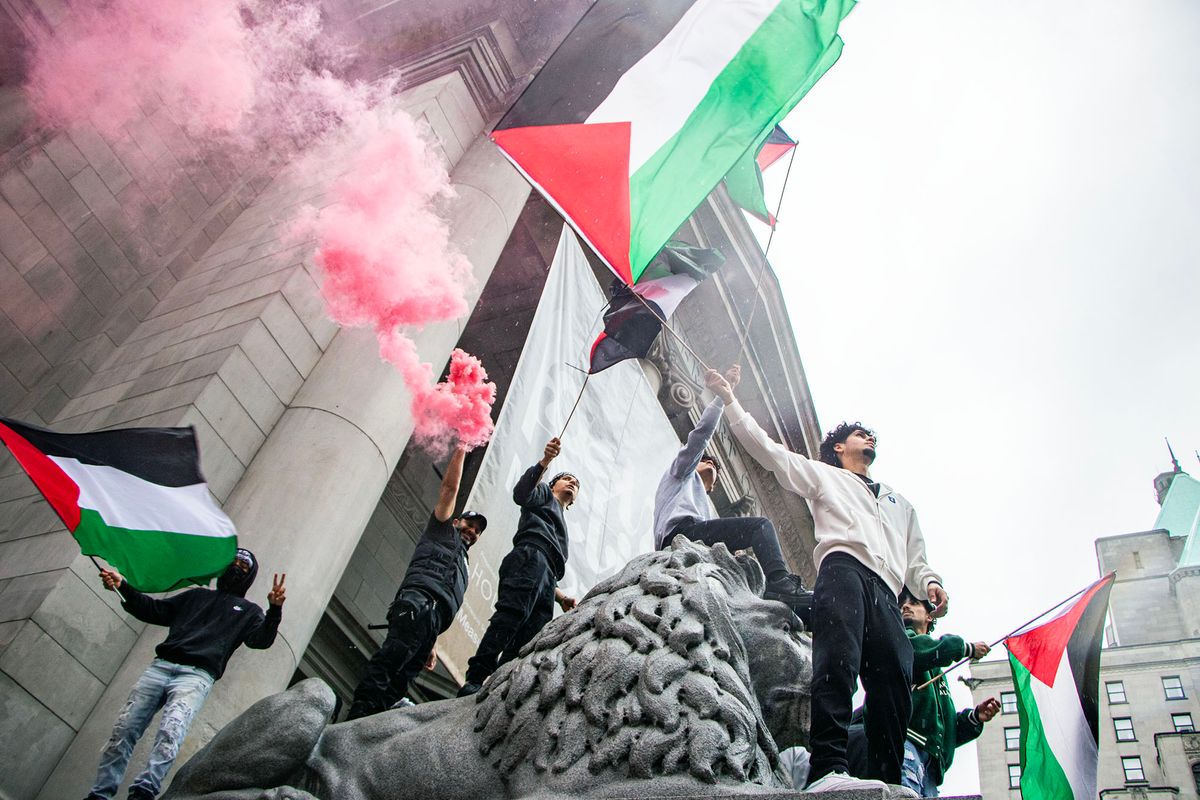
In the lead up to the protests, the RCMP and other police forces across the country indicated that they would closely monitor the events, with a particular emphasis on protecting Jewish communities.
To Abu Ali, such responses implied that Arabs and Muslims in Canada pose a threat to Jewish Canadians. This notion, he said, is deeply problematic. “I felt disgusted and upset,” he said, adding that it’s also wrong to link the entire Jewish community to Israel.
According to a report issued by Toronto Police Chief Myron Demkiw in December, hate crimes have been increasing against Muslims, Palestinians and Jewish people since October 7.
“We did not hear that official and special support for Arab or Muslim communities when Israel has continuously attacked Palestinians on a daily basis,” Abu Ali said, also referring to recent events in the occupied West Bank, where Hamas is not in power but that has seen a massive uptick in attacks by Israeli settlers and soldiers against Palestinians.
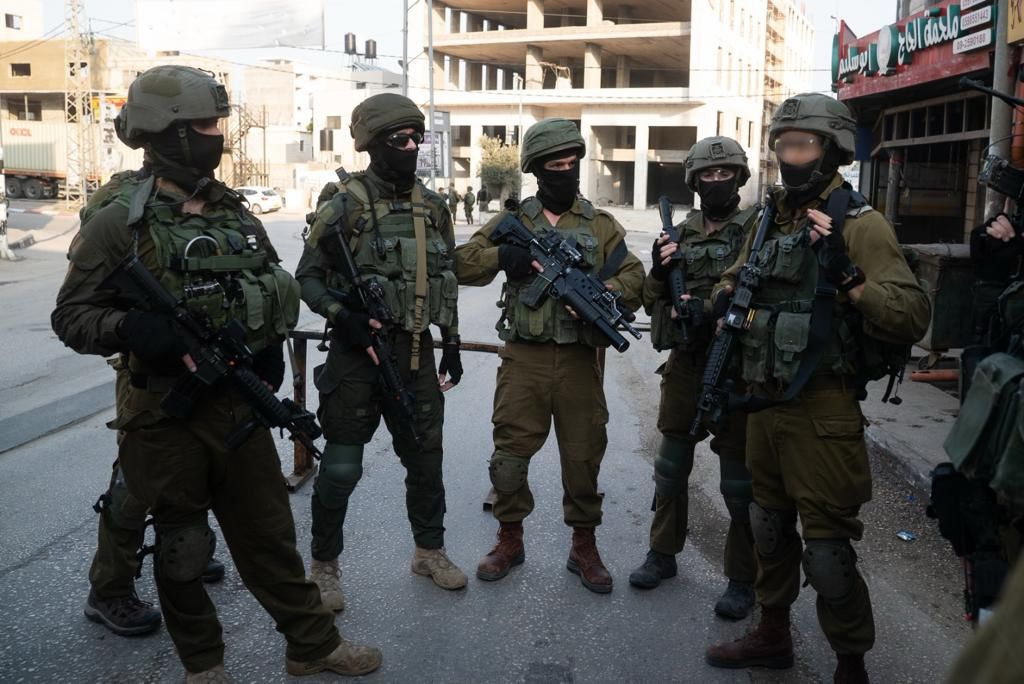
According to the United Nations Office for the Coordination of Humanitarian Affairs (OCHA), 507 Palestinians were killed in the occupied West Bank in 2023, making it the deadliest year for Palestinians since 2005. In its latest Protection of Civilians Report published on September 26, (11 days before the Hamas-led attack on Israel), OCHA said Israeli forces had killed 38 children in the occupied West Bank compared with 35 in all of 2022.
Abu Ali said he’s not surprised by the Canadian government and media’s reaction to Israel’s campaign.
“Palestinian voices have always been put under question,” he said. “As a Palestinian, you have to justify your moral stance. You have to prove what you say, even though it’s in the news itself. The media puts us under scrutiny to prove the already proven, which puts a shadow of doubt in our narrative versus when it comes to the Israelis.”
“If it is not racism, what exactly is it?”
Clear Media Bias
When the latest phase of the conflict erupted, Israeli officials claimed that members of Hamas had decapitated Israeli babies on October 7. That story proved to be without evidence, but it nonetheless made the rounds in international news headlines.
The Breach, meanwhile, reported that CTV News featured 62 per cent more Israeli voices than those of Palestinians, and allowed Israeli officials to make false claims and use racist language without challenge or pushback.
The Breach also found a lack of balance in CBC’s coverage, and spoke to a staffer who said the broadcaster was “sanitizing the language” used to describe Israel’s war on Gaza.
The dehumanization of Palestinians in Canadian media is not limited to questioning their credibility or suppressing their stories, said Hussein Hoballah, chief editor of Sadaa Al Mashrek, an Arabic news outlet based in Montreal.
“Dehumanization is an accumulated result due to the absence of objectivity in covering the conflict,” said Hoballah. “This came as a result of the jump on historical facts for decades, and years of embracing the Israeli narratives and ignoring the Palestinian.”
“Two journalists were fired because they publicly supported Palestine,” he added, referring to Yara Jamal, who was fired by CTV News, and Zahraa Al-Akhrass, who was fired by Global News.
Hoballah pointed out that the language used in the media affects not only how people perceive the news, but also how they see Palestinians.
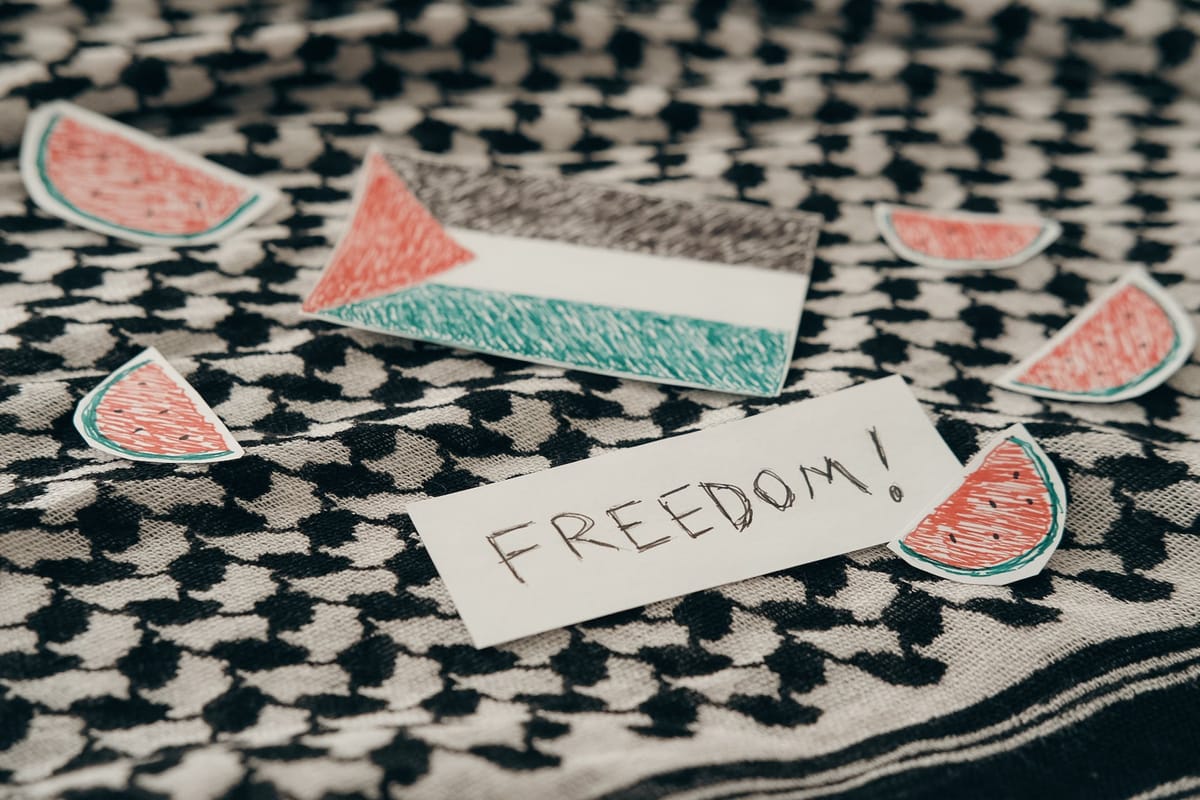
The absence of historical context in reporting and commentary leaves the impression that battles between armed Palestinian groups and the state of Israel are random and limited to the time frame of specific events.
“No one talked or reported about the Palestinians in the Israeli prisons who had no trial, or the degradation of the Al-Aqsa Mosque,” Hoballah said, noting that conflicts do not come out of a vacuum.
Distortions Of History
For Palestinians, the current conflict can be traced in significant part back to the Nakba, which is commemorated annually on May 15.
Nakba is an Arabic word that translates to “catastrophe.” It refers to the ethnic cleansing of approximately 750,000 Palestinians by Zionist militias in 1947 and 1949 to make way for the state of Israel.
The Israeli government has sought to suppress public discussion about the Nakba. In 2011, Israel enacted the “Nakba Law,” which authorizes the Israeli finance minister to punish any public institution that commemorates Nakba Day by cutting their funds.
Human Rights Watch criticized the law as a means to silence anyone who contradicts Israel’s narrative about its foundation.
The Nakba is sometimes briefly mentioned in Canadian news reports without elaborating on the historical events and context that led to it.
The idea of establishing a state for Jewish people in Palestine became prominent in the late nineteenth century in Europe with the Zionist movement, which was influenced by a larger trend of growing nationalist movements and waves of deadly pogroms against Jewish people in Europe. Since then, Jewish migration to Palestine has increased.
Zionist militias were trained by the United Kingdom, which ruled Palestine until 1948, after taking it from the Ottoman Empire following the First World War. The U.K. had issued the Balfour Declaration in November 1917, which pledged to establish “a national home for the Jewish people.”
“Israel is a built-up settler-colonial state,” said Abu Ali, noting that Palestinian society before the British Mandate and the Zionist project of occupying Palestine was home to a diverse range of religious and ethnic backgrounds.
Palestinians rebelled against colonialism, Abu Ali emphasized, not against Jewish people, for the simple fact that Jews have been part of Palestinian society for centuries. What changed was the British colonial rule and the dispossession of Palestinian land to make way for the establishment of a Zionist state in Palestine.
The Nakba was also preceded by international decisions about Palestinian land that were made without the consultation or consent of the Palestinians themselves. In November 1947, after the Second World War and the Holocaust, the UN General Assembly adopted Resolution 181.
Under that resolution, which charted the end of the British Mandate, historic Palestine was partitioned into one Arab and one Jewish state, with Jerusalem placed under a special international administration.
“Who gave the UN General Assembly the right to divide a land or decide anything to do with it against the will of its Indigenous people?,” Abu Ali said. “You cannot abstract justice from peace. It is not complicated.”
Palestinian territories encompassing the Gaza Strip, West Bank and East Jerusalem were illegally occupied by Israel in 1967, after what is known as the Six-Day War between Israel and neighbouring Arab countries.
Israel formally withdrew its military from Gaza in 2005, but human rights groups maintain that the occupation of that territory persisted after the formal withdrawal of Israeli forces.
Canada’s long-time position is that it is committed to a “two-state” solution. The federal government’s official policy “does not recognize permanent Israeli control over territories occupied in 1967 - the Golan Heights, the West Bank, East Jerusalem and the Gaza Strip.”
But on Nov. 9, 2023, Canada was one of seven countries that voted against a UN resolution against the illegal Israeli occupation, which reaffirmed that “the Israeli settlements in the Occupied Palestinian Territory, including East Jerusalem, and in the occupied Syrian Golan are illegal and an obstacle to peace and economic and social development.”
Abu Ali described Canada’s position at the UN in one word: “hypocrisy.”
War And Apartheid
In addition to the catastrophic death toll caused by Israel’s latest assault, more than 1.9 million Palestinians in Gaza, 85 per cent of the total population, have been displaced from their homes.
Besides joining a non-binding call for a ceasefire at the United Nations General Assembly last December, Canada has implemented few practical measures — such as imposing an embargo on military exports to Israel — to help bring an end to Israel’s bombing campaign.
Even before Israel’s ongoing bombardment, Gaza was described by several humanitarian organizations as “the world’s largest open-air prison.”
Gaza relies heavily on aid co-ordinated by the UN Palestinian refugee agency, UNRWA. However, Canada recently joined other countries in cutting funds to that organization, after Israel claimed, without evidence, that a handful of UNRWA employees participated in the October 7 attacks.
Meanwhile, Canada has been accused by some immigration lawyers of imposing “onerous and unfair” requirements on Gazan Palestinians seeking to reunite with their families Canada.
Gaza has a population of about two million, of whom approximately 70 per cent are refugees or descendants of refugees, and about half of whom are children. Even before Israel’s latest attack inflicted catastrophic starvation and public health crises, approximately 68 per cent of people in Gaza suffered from food insecurity, and just five per cent had access to potable pipe water.
“What could we expect from a government not seeing us as human, and continuing to support an apartheid state?,” said Abu Ali of the Trudeau government.
The Trudeau government has rejected reports in recent years from world-leading human rights organizations that found Israel maintains a constitutionally entrenched system of apartheid over Palestinians.
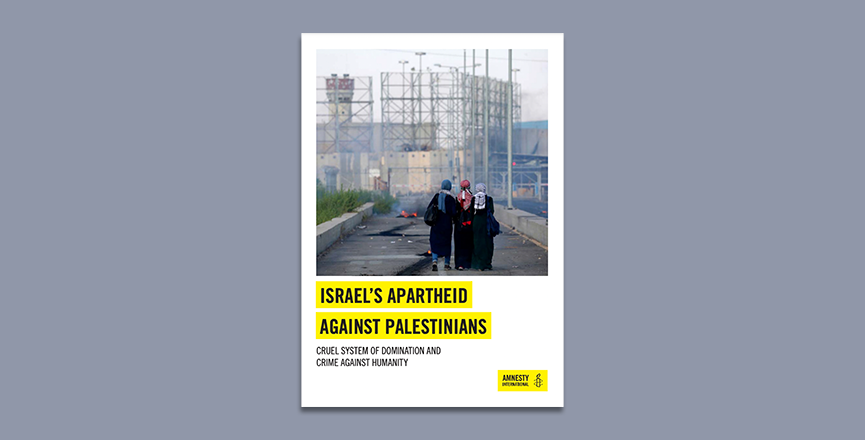
“We are human in blood and flesh exactly as everyone,” said Abu Ali. “We have our dreams, memories, desires, stories, names, families. We want to live in peace and dignity, free of oppression.”
“The more you support the oppressor, the less you serve humanity.”
Ali Al Ashoor is a poet and journalist. He is the author of four books of poetry.

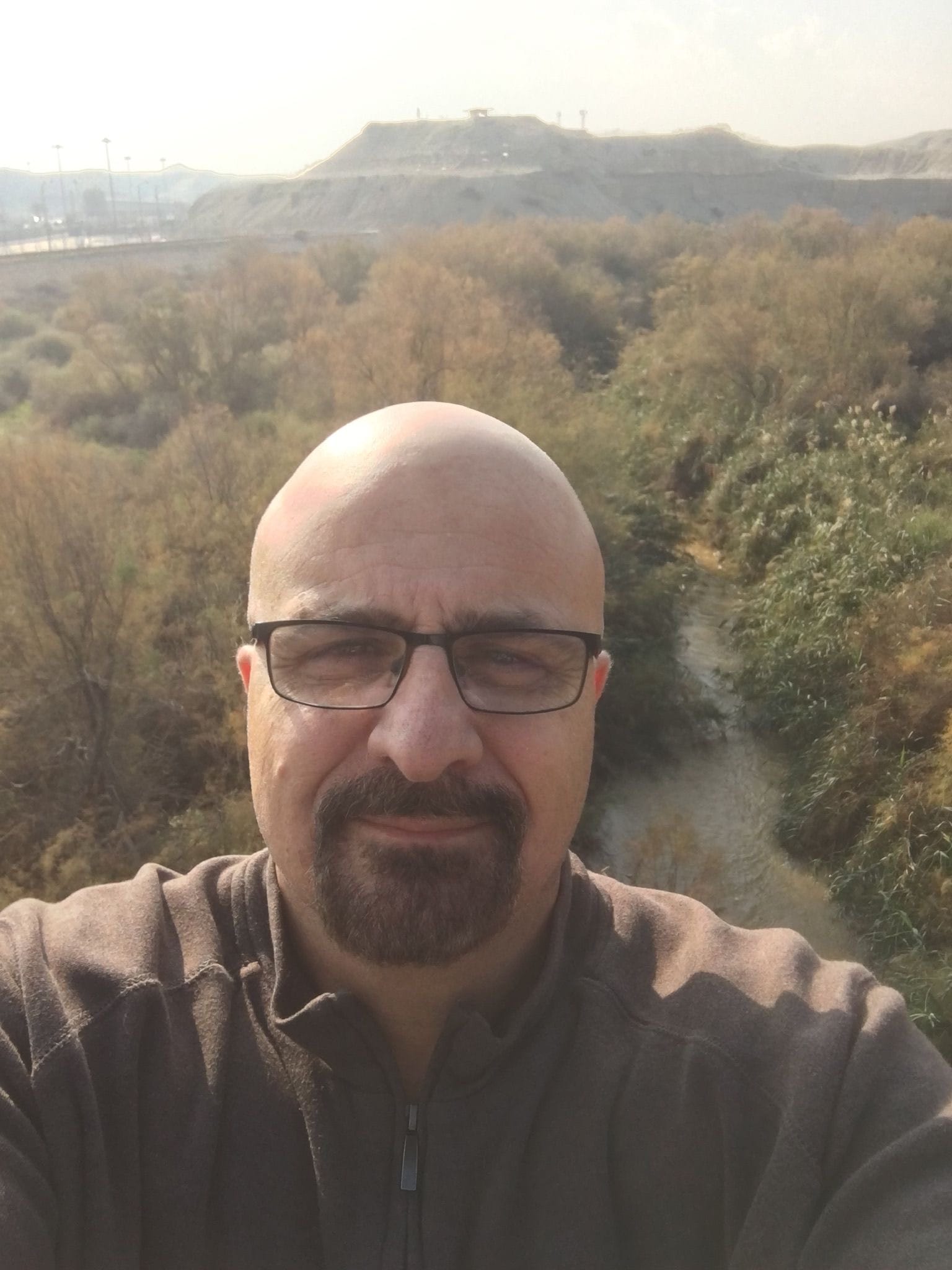

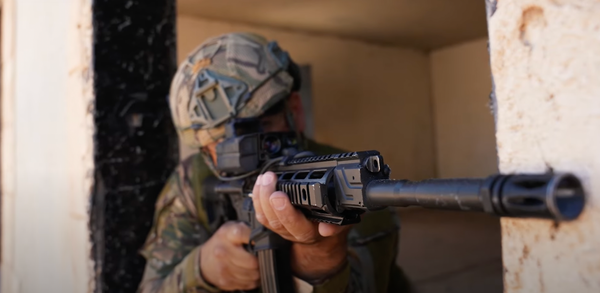
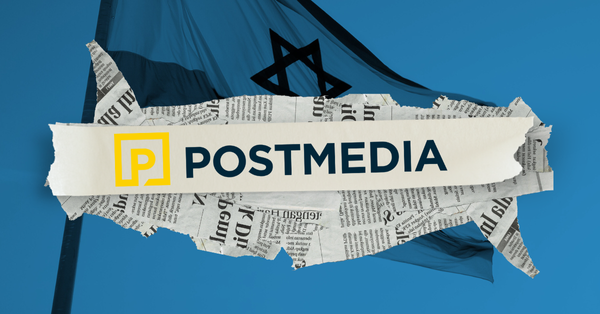
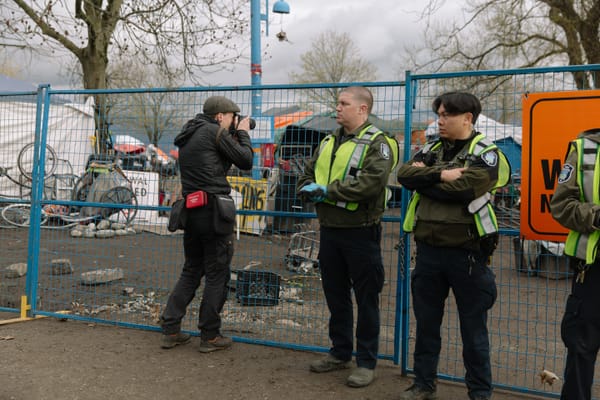
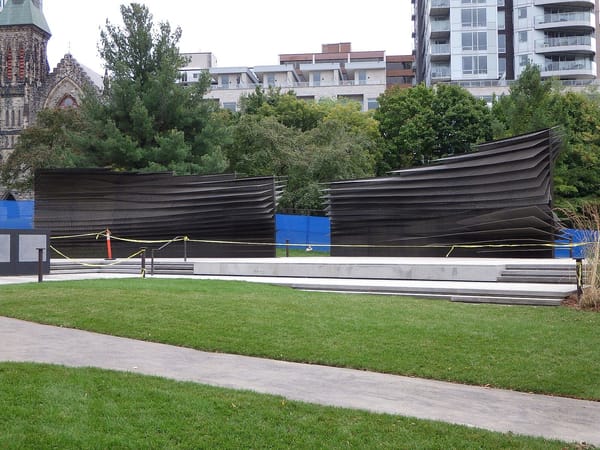
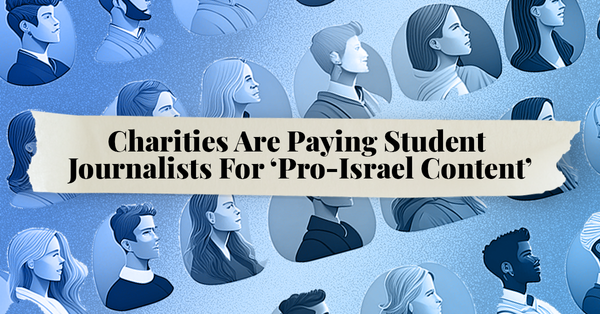
Member discussion